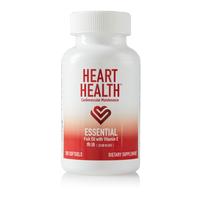這是所有優質成份的最佳組合
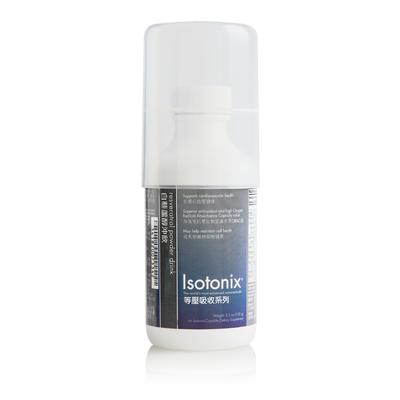
益處
- 支援心血管健康
- 強效抗氧化物並擁有高ORAC值
- 可有助維持細胞健康
此產品並不供作診斷、治療或預防任何疾病之用。
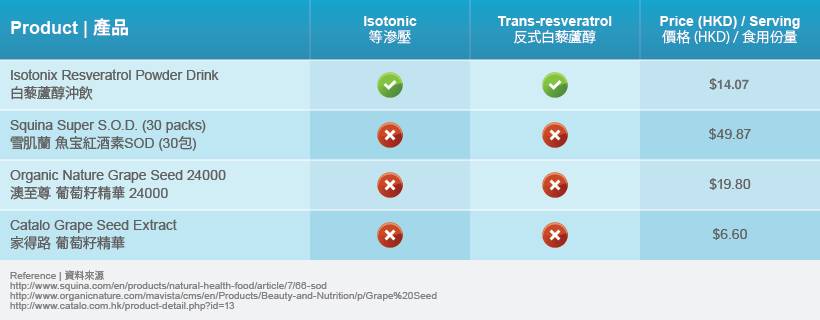
產品分類
不含麩質 - 本產品不含可檢測出之麩質*
不含可檢測出之基改成份(GMO) - 本產品不含可檢測出之基因改造生物成份
純素 - 本產品不含動物相關成份
等滲壓營養補充沖飲 - 易於飲用的營養補充品 / 健康食品,透過等滲壓狀態達致更佳的營養吸收
品質標準 - 良好生產規範(GMP)運作與標準化成份
已檢測:重金屬丶微生物污染物丶過敏原丶效力丶純度及特性
*美國食品藥品監督管理局(FDA)將含有少於20PPM麩質的製成產品列為不含麩質
詳細資料
Isotonix Resveratrol白藜蘆醇沖飲是等滲壓的補充品,由三種專利成份組成:Resveravine(含 20% 白藜蘆醇萃取物)、BioVin Advanced(含 5 % 白藜蘆醇萃取物)及VitaBlue (野生藍莓萃取物),用作促進正常細胞健康。透過促進健康的血小板活動、血管舒張作用及提供抗氧化保護, Isotonix Resveratrol 白藜蘆醇沖飲 的作用是維持細胞健康,促進正常細胞週期活動, 並促進心血管健康。 Resveravine 是萃取自葡萄樹 莖 的反式白藜蘆醇( 20% 純度)及 Σ - 葡萄素的混合物,能相互合作以增強白藜蘆醇萃取物的效用。反式白藜蘆醇是存在於紅酒葡萄及果汁內主要的同分異構物,而 Resveravine 含反式白藜蘆醇的濃度較其他葡萄皮造成的產品高出一百至三百倍。根據美國俄勒崗州 立 大學萊納斯波林研究所表示,反式白藜蘆醇或比其他白藜蘆醇同分異構物有更高的生物可用性。 Resveravine 提供對付氧化壓力更強的自由基防禦,進一步促進正常的細胞活動, 並提供 比純白藜蘆醇萃取物更強的抗氧化保護。
“Isotonic” 的意思是 “ 相同壓力 ” (等滲),即是與人體的血液、血漿及眼淚擁有相同的化學特質。人體內的所有液體均擁有特定的濃度,稱為滲透壓。人體一般的滲透壓是等滲的,使得人體組織能維持一貫的水平。一種物質如要被人吸收並在人體新陳代謝機制裏使用, 必須 達到 等滲壓溶液 狀態 。
Isotonix 的口服補充品是透過等滲溶液傳送,即是說,人體不用花太多功夫把這溶液吸收。此懸浮液的等滲壓讓營養能進入小腸並快速被血液吸收。服用 Isotonix 的產品,損失的營養份量非常微小,令營養吸收極為快速,並提供最佳效果。
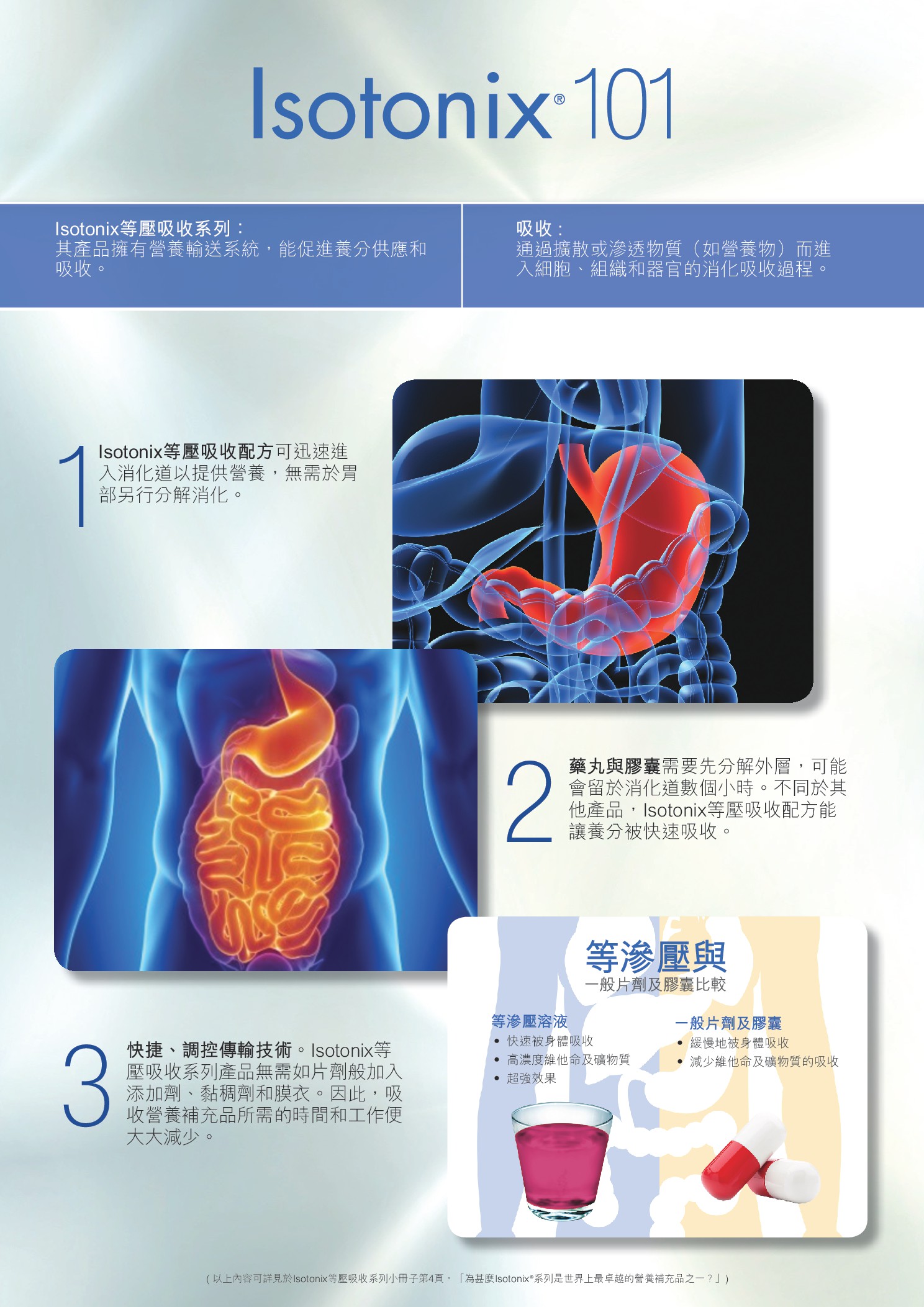
了解更多
Isotonix®輸送系統
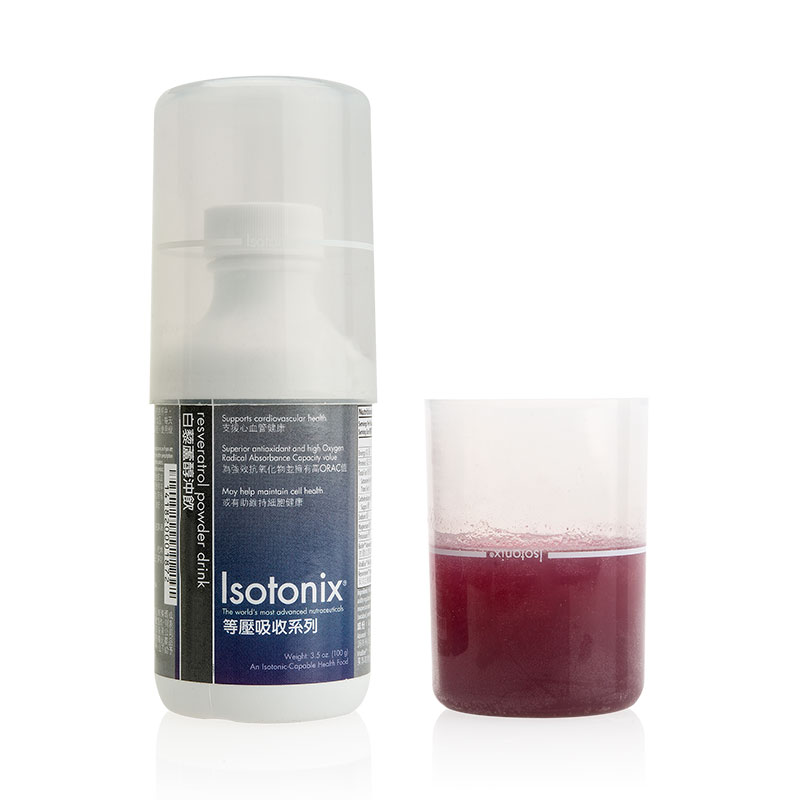
成份
Resveravine (20% 白藜蘆醇萃取物 )
白藜蘆醇是紅酒內的天然抗氧化物。 Resveravine 是葡萄的一種天然萃取物,按標準含有 20% 白藜蘆醇低聚體類似物 ,含反式白藜蘆醇的濃度較其他葡萄皮造成的產品高出許多。Resveravine 提供抗氧化保護,促進正常的血小板活動、血管舒張及血液流動,這一切都能支援心血管健康。
作為另類的策略,有新研究專注於限制熱量的發展上,專門研究透過挑選出受限制熱量影響的新陳代謝及壓力反應途徑來模擬限制熱量的效應,但不限制熱量攝取。白藜蘆醇被視為潛在的限制熱量類似物質。
給老鼠餵食白藜蘆醇大大增加其有氧代謝能力。白藜蘆醇促進健康的粒線體功能,並支援能量消耗,藉 此 促進健康體重。一項對高熱量飲食老鼠的在活體內測試顯示, 白藜蘆醇 使 高熱量飲食的中年老鼠的生理狀況變 得 像一般熱量飲食的老鼠一樣,並促進 其 整體健康。
BioVin Advanced ( 含 5% 白藜蘆醇的法國紅酒萃取物 )
含有原花色素( OPC )的紅酒萃取物,透過支援正常的血液循環、鞏固血管壁及促進正常的血小板活動,對支援心血管健康極為有效。 BioVin Advanced 能提供原花色素及白藜蘆醇。紅酒葡萄有兩種主要成份顯示擁有強效抗氧化能力:紅酒多酚類(類黃酮)及反式白藜蘆醇(以上曾提及)。原花色素是類黃酮複合物,能作為人體內超強的抗氧化物。 BioVin Advanced 結合原花色素及反式白藜蘆醇的抗氧化特質,以促進第二期代謝作用酵素,這些酵素參與人體細胞的解 毒 作用, 並參與清除 自由基特質。
VitaBlue 野生藍莓萃取物( 12.5% 花青素 )
在眾多水果及蔬菜中,藍莓的氧自由基吸收能力為排行最高,它含有 25-30 種不同的花青素。花青素給予藍莓(及其他水果)豐富的藍及紅色,是強效的類黃酮抗氧化物。花青素的作用機制曾在 分 子層面 被研究過 。藍莓提供大量綠原酸,綠原酸被認為對促進細胞健康非常重要。 VitaBlue 野生藍莓萃取物支援人體的環氧化酶 2 ( COX-2 )抑制劑,並提供比新鮮藍莓能提供的更大量強效抗氧化物。 VitaBlue 野生藍莓萃取物顯示對促進心血管健康有效,並能促進 正常細胞週期 的 活動 ,及維持整體細胞健康。
常見問答
白藜蘆醇含有酒的萃取物,此產品是否不含酒精成份?
是。Isotonix白藜蘆醇沖飲不含酒精成份。
我現在正服用控制膽固醇水平的藥物,我可以同時服用白藜蘆醇沖飲嗎?
現時,沒有文獻記載控制膽固醇藥物與Isotonix白藜蘆醇沖飲所含有的任何成份有相互影響。然而,服用任何天然補充品前,請先諮詢你的醫生。
哪些人應服用此產品?
若你想提升細胞健康並維持良好的心血管健康,那麼 Isotonix白藜蘆醇沖飲就最適合你服用。
Isotonix Resveratrol 白藜蘆醇沖飲有哪些禁忌嗎?
有。如你正在服用薄血丸(可邁丁)或其他抗血小板/抗凝血藥,就不應服用此產品。如你正服用單氨氧化酶抑制劑藥物,亦不應服用此產品。擁有雌激素過敏癌症歷史的女性,如乳癌、卵巢癌及子宮癌等,不應服用此產品。如你正服用其他處方藥物或患有長期疾症,在服用此產品前,應先諮詢你的醫生。懷孕及哺乳期間之女士不應服用此產品。
我已在服用綜合維他命補充品,為甚麼還需要Isotonix白藜蘆醇沖飲呢?
Isotonix白藜蘆醇沖飲並非綜合維他命,此產品專門用作促進細胞健康,並提供心血管支援。
如果我是酗酒者,我可否仍服用由紅酒成份製成的Isotonix白藜蘆醇沖飲?
可以。Isotonix 白藜蘆醇沖飲並不含有酒精,白藜蘆醇是從製造紅酒的葡萄皮及葡萄樹提取出來的萃取物。
服用Isotonix 白藜蘆醇沖飲會醉嗎?
不會。Isotonix 白藜蘆醇沖飲並不含有酒精。
此產品是否不含麩質?
是。
此產品是 否 適合 素食 者 ?
是。 I sotonix 白藜蘆醇沖飲是素食產品。
此產品是否男女均適合服用?
是。然而,擁有雌激素過敏癌症(乳癌、卵巢癌及子宮癌)歷史的女性不應服用此產品。懷孕及哺乳期間之女士不應服用此產品。
如我服用此產品,仍需要 OPC-3 嗎?
Isotonix OPC-3 沖飲是一種超強的抗氧化物,對人體健康有多種益處。Isotonix 白藜蘆醇沖飲可與其他抗氧化劑一起服用;事實上,抗氧化物的作用分為幾種機制,而各種抗氧化物是互相支持的。作為完整、全面的抗氧化防護,同時服用 OPC-3 沖飲及白藜蘆醇 沖飲是明智的選擇,以保護你的身體免受自由 基 的損害。
科學
- Aggarwal B et al. Role of resveratrol in prevention and therapy of cancer: preclinical and clinical studies. Anticancer Research. 24(5A):2783-840, 2004.
- Bauer, J. H., et al. An accelerated assay for the identification of lifespan-extending interventions in Drosophila melanogaster. Proc Natl Acad Sci U S A. 101:12980-12985, 2004.
- Baur J et al. Resveratrol improves health and survival of mice on a high-calorie diet. Nature. 444(7117):337-42, 2006.
- Belguendouz, L., et al. Resveratrol inhibits metal ion-dependent and independent peroxidation of porcine low-density lipoproteins. Biochemical Pharmacology. 53(9):1347-1355, 1997.
- Bhat K et al. Biological effects of resveratrol. Antioxidants and Redox Signaling. 3(6):1041-64, 2001.
- Review. Borra M et al. Mechanism of human SIRT1 activation by resveratrol. Journal of Biological Chemistry. 280(17):17187-95, 2005.
- Chen Y. Resveratrol-induced cellular apoptosis and cell cycle arrest in neuroblastoma cells and antitumor effects on neuroblastoma in mice. Surgery.136(1):57-66, 2004.
- Dario et al. Resveratrol prolongs life span and retards the onset of age-related markers in a short-lived vertebrae. Current Biology, 2006.
- Ding, X. Z., et al. Resveratrol inhibits proliferation and induces apoptosis in human pancreatic cancer cells. Pancreas. 25(4):71-76, 2002.
- Dong Z. Molecular mechanism of the chemopreventive effect of resveratrol. Mutation Research. 523-524:145-150, 2003.
- Donnelly L et al. Anti-inflammatory Effects of Resveratrol in Lung Epithelial Cells: Molecular Mechanisms. Am J Physiol Lung Cell Mol Physiol, 2004 .
- Faria A et al. Antioxidant properties of prepared blueberry (Vaccinium myrtillus) extracts. Journal of Agricultural and Food Chemistry. 53(17):6896-902, 2005.
- Frémont L. Biological effects of resveratrol. Life Sciences 66:663-673, 2000.
- Fremont, L., et al. Antioxidant activity of resveratrol and alcohol-free wine polyphenols related to LDL oxidation and polyunsaturated fatty acids. Life Sciences. 64(26):2511-2521, 1999.
- Garvin S et al. Resveratrol induces apoptosis and inhibits angiogenesis in human breast cancer xenografts in vivo. Cancer Letters. 231(1):113-22, 2006.
- Goh S et al. The red wine antioxidant resveratrol prevents cardiomyocyte injury following ischemia-reperfusion via multiple sites and mechanisms. Antioxidant Redox Signal. 9(1):101-13, 2007.
- Hao H et al. Mechanisms of cardiovascular protection by resveratrol. Journal of Medicinal Food. 7(3):290-298, 2004.
- Heynekamp J et al. Substituted trans-stilbenes, including analogues of the natural product resveratrol, inhibit the human tumor necrosis factor alpha-induced activation of transcription factor nuclear factor kappaB. Journal of Medicinal Chemistry. 49(24):7182-9, 2006.
- Holmes-McNary M and Baldwin A Jr. Chemopreventive properties of trans-resveratrol are associated with inhibition of activation of the IkappaB kinase. Cancer Research. 60:3477-3483, 2000.
- Hou D et al. Molecular Mechanisms Behind the Chemopreventive Effects of Anthocyanidins. Journal of Biomedicine and Biotechnology. 2004: (5):321-325, 2004.
- Hou D. Potential mechanisms of cancer chemoprevention by anthocyanins. Current Molecular Medicine. 3(2):149-159, 2003.
- Howitz, K. T., et al. Small molecule activators of sirtuins extend Saccharomyces cerevisiae lifespan. Nature. 425(6954):191-6, 2003.
- Hung L et al. Cardioprotective effect of resveratrol, a natural antioxidant derived from grapes. Cardiovascular Research. 47:549-555, 2000.
- Hung L et al. Resveratrol protects myocardial ischemia-reperfusion injury through both NO-dependent and NO-independent mechanisms. Free Radicals in Biology and Medicine. 36(6):774-81, 2004.
- Hwang J et al. Resveratrol induces apoptosis in chemoresistant cancer cells via modulation of AMPK signaling pathway. Annals NY Academy of Sciences. 1095:441-8,2007.
- Ignatowicz E and Baer W. Resveratrol, a natural chemopreventive agent against degenerative diseases. Polish Journal of Pharmacology. 53(6):557-69, 2001. Jang M et al. Cancer chemopreventive activity of resveratrol, a natural product derived from grapes. Science. 275:218-220, 1997.
- Jang M et al. Cancer chemopreventive activity of resveratrol. Drugs in Experimental Clinical Research. 25:65-77, 1999.
- Kaeberlein M et al. Substrate-specific activation of sirtuins by resveratrol. Journal of Biological Chemistry. 280(17):17038-45, 2005.
- Kim, Y. A., et al. Antiproliferative effect of resveratrol in human prostate carcinoma cells. Journal of Medicinal Food. 6(4):273-280, 2003.
- Kopp P. Resveratrol, a phytoestrogen found in red wine. A possible explanation for the conundrum of the 'French paradox'? European Journal of Endocrinology. 138(6):619-620, 1998.
- Kundu, J. K., et al. Resveratrol inhibits phorbol ester-induced cyclooxygenase-2 expression in mouse skin: MAPKs and AP-1 as potential molecular targets. Biofactors. 21(1-4):33-39, 2004.
- Lagouge M et al. Resveratrol improves mitochondrial function and protects against metabolic disease by activating SIRT-1 and PGC-1alpha. Cell. 127(6):1109-22, 2006.
- Lepoivre M et al. Resveratrol, a remarkable inhibitor of ribonucleotide reductase. FEBS Letters. 421:277-279, 1998. Lin J et al. Chemoprevention of cancer and cardiovascular disease by resveratrol. Proceedings of the National Science Council Republic of China. 23(3):99-106, 1999.
- Review. Manna S et al. Resveratrol suppresses TNF-induced activation of nuclear transcription factors NF-kappaB, activator protein-1 and apoptosis: potential role of oxygen intermediates and lipid peroxidation. Journal of Immunology. 164(12):6509-6516, 2000.
- Manna S et al. Resveratrol suppresses TNF-induced activation of nuclear transcription factors NF-kappaB, activator protein-1 and apoptosis: potential role of oxygen intermediates and lipid peroxidation. Journal of Immunology. 164(12):6509-6516, 2000.
- Martín A et al. Resveratrol, a polyphenol found in grapes, suppresses oxidative damage and stimulates apoptosis during early colonic inflammation in rats. Biochemical Pharmacology. 67(7):1399-410, 2004.
- Martín A et al. The effects of resveratrol, a phytoalexin derived from red wines, on chronic inflammation induced in an experimentally induced colitis model. British Journal of Pharmacology. 147(8):873-85, 2006.
- Martinez J and Moreno J. Effect of resveratrol, a natural polyphenolic compound, on reactive oxygen species and prostaglandin production. Biochemical Pharmacology. 59:865-870, 2000.
- Mgbonyebi O. Antiproliferative effect of synthetic resveratrol on human breast epithelial cells. International Journal of Oncology. 12(4):865-869, 1998.
- Nielsen M et al. Resveratrol reverses tumor-promoter-induced inhibition of gap-junctional intercellular communication. Biochemical and Biophysical Research Communications. 275:804-809, 2000.
- Olas B and Wachowicz B. Resveratrol and vitamin C as antioxidants in blood platelets. Thrombosis Research. 106(2):143-8, 2002.
- Olas B and Wachowicz B. Resveratrol reduces oxidative stress induced by platinum compounds in blood platelets. General Physiology and Biophysics. 23(3):315-26, 2004.
- Olas B et al. Effect of resveratrol, a natural polyphenolic compound, on platelet activation induced by endotoxin or thrombin. Thrombosis Research. 107(3-4):141-5, 2002.
- Olas B et al. Resveratrol protects against peroxynitrite-induced thiol oxidation in blood platelets. Cellular and Molecular Biology Letters. 9(4A):577-87, 2004.
- Pace-Asciak C et al. The red wine phenolics trans-resveratrol and quercetin block human platelet aggregation and eicosanoid synthesis: implications for protection against coronary heart disease. Clin Chim Acta. 235:207-219, 1995.
- Pace-Asciak C et al. The red wine phenolics trans-resveratrol and quercetin block human platelet aggregation and eicosanoid synthesis: implications for protection against coronary heart disease. Clin Chim Acta. 235:207-219, 1995.
- Picard F et al. Sirt1 promotes fat mobilization in white adipocytes by repressing PPAR-gamma. Nature. 429(6993):771-776, 2004.
- Porcu M et al. The emerging therapeutic potential of sirtuin-interacting drugs: from cell death to lifespan extension. Trends in Pharmacological Sciences 26, 2005. Pozo-Guisado, E., et al. Resveratrol-induced apoptosis in MCF-7 human breast cancer cells involves a caspase-independent mechanism with downregulation of Bcl-2 and NF-kappaB. International Journal of Cancer 115(1):74-84, 2005.
- Provinciali M et al. Effect of resveratrol on the development of spontaneous mammary tumors in HER-2/neu transgenic mice. International Journal of Cancer. 115(1):36-45, 2005.
- Sato M et al. Journal of Cardiovascular Pharmacology. 35(2):263-268, 2000.
- Schneider Y et al. Anti-proliferative effect of resveratrol, a natural component of grapes and wine, on human colonic cancer cells. Cancer Letters. 158(1):85-91, 2000.
- Sinclair D et al. Resveratrol improves health and survival of mice on a high-calorie diet. Nature, 2006.
- Sovak M. Grape extract, resveratrol, and its analogs: a review. Journal of Medicinal Food. 4(2):93-105, 2001.
- Subbaramaiah K et al. Resveratrol inhibits cyclooxygenase-2 transcription and activity in phorbol ester-treated human mammary epithelial cells. Journal of Biological Chemistry. 273:21875-21882, 1998.
- Subbaramaiah K et al. Resveratrol inhibits cyclooxygenase-2 transcription in human mammary epithelial cells. Annal NY Academy Sciences. 889:214-223, 2000.
- Szende B et al. Dose-dependent effect of resveratrol on proliferation and apoptosis in endothelial and tumor cell cultures. Experimental and Molecular Medicine. 32(2):88-92, 2000.
- Tsai S et al. Suppression of nitric oxide synthase and the down-regulation of the activation of NF-kappaB in macrophages by resveratrol. British Journal of Pharmacology 126:673-680, 1999.
- Wang Z et al. Effects of red wine and wine polyphenol resveratrol on platelet aggregation in vivo and in vitro. International Journal of Molecular Medicine. 9(1):77-9, 2002.
- Yi W et al. Phenolic compounds from blueberries can inhibit colon cancer cell proliferation and induce apoptosis. Journal of Agricultural and Food Chemistry 53(18):7320-9, 2005. Zou J et al.
- Effect of red wine and wine polyphenol resveratrol on endothelial function in hypercholesterolemic rabbits. Int J Mol Med. 11(3):317-20, 2003.
- Zou J et al. Suppression of mitogenesis and regulation of cell cycle traverse by resveratrol in cultured smooth muscle cells. International Journal of Oncology. 15:647-651, 1999.


